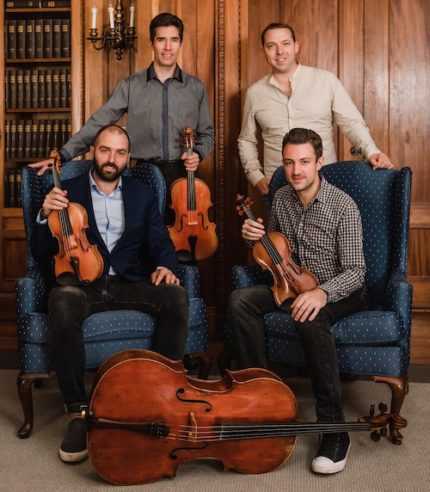North Shore Chamber Fest opens with masterful Mendelssohn

The North Shore Chamber Music Festival saw a banner year in 2021. Last year’s iteration marked the tenth anniversary of the festival’s founding and was among the first presenters in Chicagoland to herald the return of live music after more than a whole year of virtual performances — a two-pronged triumph of longevity.
This year’s festival, then, has a high bar to top, but the opening performances at Northbrook’s Village Presbyterian Church on Thursday night managed to do so in style.
Founded and run by longtime North Shore married couple, violinist/artistic director Vadim Gluzman and pianist/executive director Angela Yoffe, the festival carries a convivial spirit suited to the relaxed nature of Chicago’s summer music season. The event also holds a precedent for consistently excellent performances by established musicians and young lions alike.
Such pairings of veteran and upstart are a key feature of the festival, and Thursday’s program led off with such a duo, matching Gluzman with pianist Janice Carissa to open the program with Bach’s C Minor Sonata for Violin and Keyboard, BWV 1017.
The duo delivered a middle-of-the-road interpretation that yielded neither to reverent asceticism nor overwrought lushness. Sonically, Gluzman and Carissa are a matched pair. The violinist’s silvery tone and supple phrasing lent an intimacy to Bach’s counterpoint, which was in turn ably supported by the pliant touch of Carissa’s accompaniment in the slower first and third movements.
The pianist was a somewhat less attentive partner at brisker tempi, occasionally pulling ahead of Gluzman in the second-movement Allegro. But Carissa left hand was the star of the concluding gigue, etching the movement’s basso continuo and fugal melodies with brisk clarity and bassoonlike bark.
The title of Thursday’s program was “Mostly Mendelssohn,” and indeed Felix Mendelssohn’s works were the inescapable center of gravity here—no more so than in the Escher Quartet’s nearly faultless reading of his String Quartet No. 5 in E-flat Major, Op. 44, no. 3.
Here is an ensemble at the height of its powers, bringing cogent interpretive choices and uncanny synchronicity to this account. Hale energy met with restrained sentimentality in the opening movement, which crackled with impassioned urgency throughout. First violinist Adam Barnett-Hart imbued Mendelssohn’s passionate solos with a honeyed sweetness, while his accompanimental figures were as finely detailed and sensitively played as any individual melody.
Indeed, ensemble sound is what sets the Escher Quartet apart. Violinists Barnett-Hart and Brenden Speltz produce sumptuously dark and covered sonority together, while Pierre Lapointe’s viola timbre is penetrating, at times even astringent. Buoyed by a light touch from cellist Brook Speltz, the Escher’s balance of crisp transparency and enveloping warmth produces an ensemble texture ideally suited to Mendelssohn’s music. In the Fifth Quartet’s captivating Adagio, one could only sit back and take that sound in.
After intermission, violinist Julian Rhee joined Janice Carissa to perform the world premiere of The Ghost of Kyiv by Dmytro Kyryliv, a 20-year-old composer and clarinetist and student at the Music and Art Univesity of the City of Vienna who hails from Ternopil, Ukraine.
Kyryliv’s short piece, which was commissioned by the festival, attempts to distill the harrowing experience of witnessing one’s homeland ravaged by war. The young composer chose a fitting palette of extended techniques to trace those moods from outright violence to the miasmatic unease of confronting the aftermath of destruction. Rhee and Carissa dispatched the piece’s contours, by turn haunting and driving, with facility and conviction.
The program’s conclusion found Gluzman and Carissa with cellist Ani Aznavoorian for Mendelssohn’s Piano Trio No. 2, a hearty main course to cap this musical feast. Where the Escher’s playing balanced joyous levity with Sturm un drang in Mendelssohn’s Quartet No. 5, this trio pumped up the drama in one of the composer’s more tempestuous creations.
The chemistry among this particular combination of musicians wasn’t as immediately apparent in the opening Allegro energico. Carissa is technically assured yet a somewhat reserved keyboardist, and so was perhaps playing against type in the firebrand piano part (no doubt written with the composer’s own dazzling pianistic abilities in mind). For another, Aznavoorian’s cello tone is robust and lined with enough grit to tear through the plushest orchestra sonority, and at first brush seemed an odd bedfellow with Gluzman’s more refined violin sound.
And yet, the results were undeniably magical in the work’s middle movements, and the string players cohered marvelously in the achingly romantic pas de deux the opens the Andante. Carissa’s fleet-fingeredness proved an asset in the trio’s brilliant, breakneck Scherzo, and she even managed to pull out all the stops in the final declamation of the Lutheran hymn at the beating heart of the work’s finale. The three musicians tore through the muscular coda and dove headlong into the final resonant chord with nearly manic drive, bringing the audience to its feet in unrestrained applause.
The North Shore Chamber Music Festival continues 7:30 p.m. Friday with Glinka’s Trio Pathetique, Respighi’s String Quartet No. 3 and Tchaikovsky’s Souvenir de Florence. nscmf.org
Posted in Uncategorized




